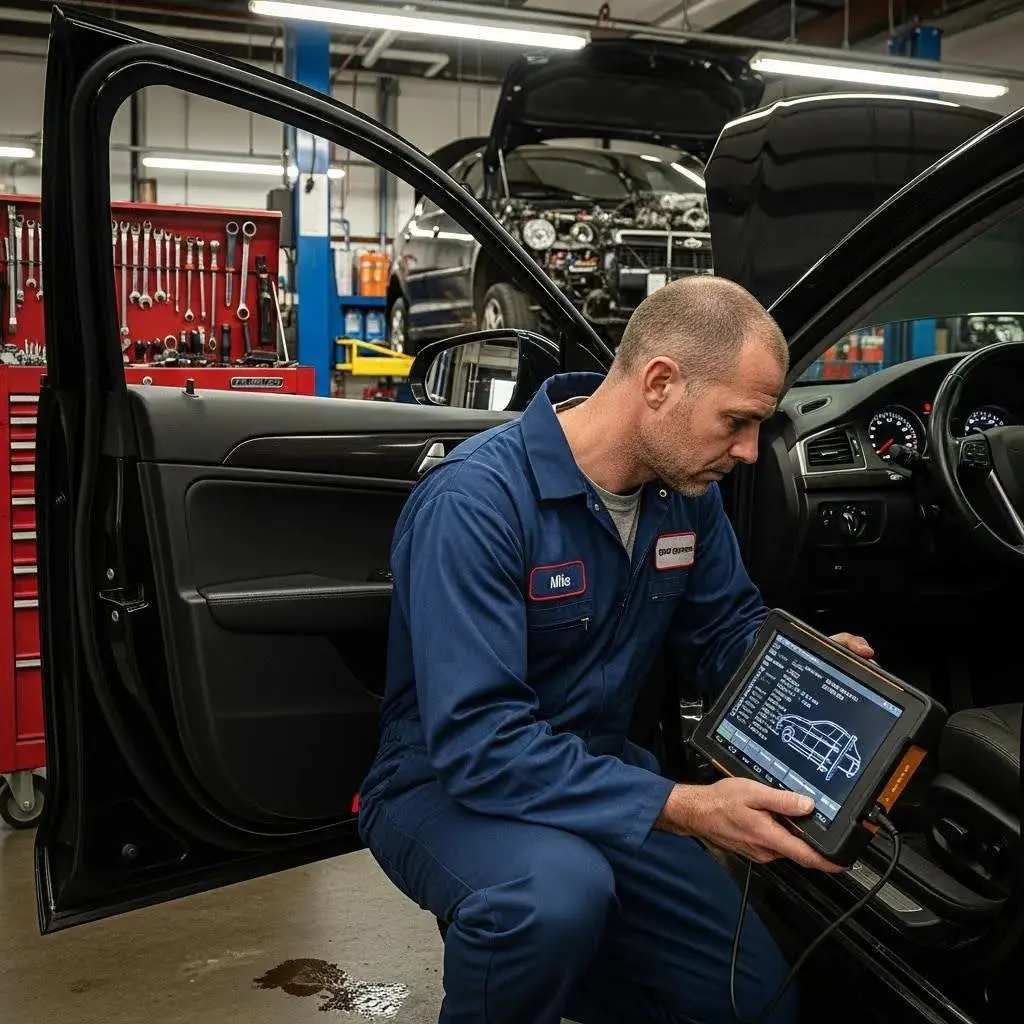Are the sultry days of summer leaving you feeling hot and bothered in your car? Say goodbye to those stuffy and uncomfortable car rides. It may be time to give your vehicle’s air conditioning system a much-needed recharge. Regassing your car’s AC system is not just about staying cool and comfortable during those sweltering drives-it is also about rejuvenating the performance of your car’s core cooling system. But how do you know when it’s time for a recharge?
In this article, we discuss all you need to know about regassing your car’s air conditioning, including the indicative signs and the process involved.
Are You Having Trouble With Your Car’s Air Conditioning?
Don’t worry! All Vehicle Services can help. Our comprehensive air con regassing service will expertly diagnose and fix any issue with your vehicle’s AC, allowing you to enjoy a cool and refreshing ride once again. Don’t endure the scorching temperatures any longer! Trust our certified technicians to provide swift and efficient resolution to your car’s air conditioning woes. With their extensive experience and commitment to affordability, you can rest assured that your car’s air conditioning system will be repaired quickly, efficiently, and affordably.
Call us at 01795 422040 to book an appointment today for a full check-up of your car’s AC system!
Air Conditioning System Regas: What you Need to Know
Your air conditioning system is a trusted companion, providing a pleasant blast of cold air whether you’re driving in scorching heat or a sudden rainstorm. However, when that trusty system falters, it can put a damper on the comfort of your journey.
Nevertheless, in most cases, a malfunctioning air conditioner requires regassing (also known as recharging) to get back to full functionality. Though people mostly take automotive air conditioning for granted, it is not the best. Don’t let the misconception that air conditioning systems require no attention fool you. Just like the rest of your vehicle, your aircon needs routine maintenance and care to continue providing you with the comfort you deserve.
How Does Car’s Air Con Regas Work?
A car’s air conditioning regas is a process that replenishes the refrigerant in a vehicle’s air conditioning system. This refrigerant is responsible for absorbing heat from the inside of the car and expelling it outside, creating a cool and comfortable temperature inside the vehicle. MOT testing requirements in the UK ensure that vehicles meet safety and environmental standards before they can be driven on public roads. These tests examine various components of the vehicle, including its brakes, lights, and exhaust system, to ensure they are functioning properly. Staying compliant with these regulations not only helps maintain the safety of your vehicle but also contributes to reducing overall emissions.
Here are six key steps involved in a car’s air conditioning regas process:
- Inspection: The first step is to inspect the air conditioning system to identify any leaks or damage to the components.
- Evacuation: The existing refrigerant is then evacuated from the system using specialised equipment.
- Refilling: The next step is to refill the system with the correct type and amount of refrigerant, as specified by the manufacturer.
- Leak Testing: The system is then tested for leaks to ensure that the refrigerant will not escape from the system.
- Performance Testing: The air conditioning system is then tested for performance to ensure that it is working at optimal capacity.
- Cleaning: Finally, the system is cleaned to remove any debris that may have accumulated during the process. This helps to maintain the efficiency and longevity of the air conditioning system.
At All Vehicle Services, you can rest assured that your car cooling needs will be correctly fixed from the first time. Contact us today to get started.
How Does a Car’s Air Conditioner Work?
A compressor, a condenser, and an evaporator are the three primary components of your car’s air conditioning system. Together, these three components move the refrigerant through a closed-loop system of high and low pressures, converting it from a gas to a liquid and back to gas while cooling your automobile.
Here is a step-by-step guide to how your car’s air conditioner works:
- Refrigerant Flow: The air conditioning system circulates refrigerant vapour from the compressor to the condenser when turned on.
- Condenser Operation: The refrigerant exits the compressor as a high-pressure, high-temperature vapour and heat is removed in the condenser, converting the vapour into a high-pressure liquid.
- Moisture Removal: The liquid refrigerant is then dried in a receiver-drier to remove moisture.
- Pressure Reduction: The refrigerant then flows from the receiver-drier to an expansion valve, where it loses pressure, becoming a low-pressure liquid.
- Heat Absorption: The refrigerant evaporates as it absorbs heat from the air in the passenger compartment and is transported into the evaporator at low pressure.
- Cool Air Distribution: A blower fan in the passenger compartment forces air over the evaporator’s exterior, pumping cold air within the vehicle. The refrigerant is then returned to the compressor as a low-pressure vapour to begin a new cycle.
Integral Parts of Vehicle’s Air Conditioning System
Your car’s air-conditioning system is comprised of five integral parts:
- Air Con Refrigerant Gas (the gas)
- Compressor (which contains the refrigerant)
- Condenser and Air Vents
- Receiver
- Thermal expansion valve
- Evaporation coils
Signs That You Need To Regas Your Car’s Air-Con System
- Decreased Cooling Efficiency: One of the most obvious signs that your car’s AC system is in need of regassing is a decrease in the efficiency of the cooling. If the air coming from the vents is not as cold as it used to be, or you don’t feel a noticeable difference when you turn on the air conditioning, it may be time for a recharge.
- Increased Fuel Consumption: Another sign that your air conditioning system is underperforming is a noticeable increase in fuel consumption. When the AC system is struggling to cool the air, it uses more energy, which leads to a decrease in fuel efficiency.
- Unpleasant Odours: A musty or mouldy smell coming from your air conditioning vents could indicate a buildup of bacteria or mould within the system, which may also cause it to work less efficiently.
- Strange Noises: A high-pitched whistling or other strange noises coming from the air conditioning system may be an indication that it needs to be regassed or serviced.
- Lack of Regular Maintenance: It is important to have your car’s air conditioning system regularly serviced, especially if you use it frequently. If you cannot remember the last time you had the system serviced, it is likely time for a recharge or maintenance check.
How Does All Vehicle Services Regas Car Air Conditioning System?
At All Vehicle Services, we understand the importance of a properly functioning air conditioning system for your car. That’s why, when it comes to regassing your car’s air conditioning, we take a comprehensive and thorough approach to ensure that your vehicle is back to its best in no time.
Our certified technicians begin the regas process by evaluating your car’s system to determine its type. Once this is established, we conduct a leak test to determine the state of your air conditioning system. Should there be any immediate leaks, we address them promptly. After the leak test has passed, we then proceed with the regassing process, which involves topping up the air conditioning system with PAG oil that has a UV die added to it. The UV die serves as an indicator for any future leaks that may occur, which makes it easier to identify and fix the problem in a timely manner.
With our thorough and professional approach to air conditioning regassing, you can rest assured that you’ll be driving with a cool and refreshed ride.
Benefits of Car Air Con Maintenance
Regassing your car’s air conditioning system regularly ensures that it works correctly. Generally, the benefits of maintaining your air conditioning include the following:
- Your vehicle will be much more comfortable, making long drives easier.
- The likelihood of an expensive issue occurring in the future is reduced significantly by regular maintenance.
- You’ll save money on fuel since your vehicle’s engine won’t have to work as hard to provide you with a cool atmosphere while driving.
- Avoiding major issues due to inadequate maintenance may save you thousands of pounds in repair bills.
Tips to Monitor Air Conditioning Gas Refill
To ensure that your air conditioning system works effectively and efficiently, you should check it regularly.
Here are some tips to help you monitor the regassing of your car’s air-con system:
- Check the temperature regularly: if it isn’t as cold as usual or takes longer than normal for the car to cool down, then there could be an issue with your refrigerant levels.
- Listen for any strange noises coming from your air-con unit: This can indicate a loss in pressure, so you will need to recharge the air-con sooner rather than later.
- Look under your vehicle’s bonnet for any signs of leakage around the hoses and other components, such as condensation or oil: If you spot anything that looks out of place, contact a professional mechanic as soon as possible.
- Take your car to a service centre regularly for an inspection: This can help detect any potential issues before they become serious, thereby saving you time and money in the long run.
By understanding How To Regas Car Aircon system and taking proper steps to maintain it, you can ensure that your vehicle runs smoothly and efficiently all year round!
Frequently Asked Questions about How to Regas Car Aircon
Q: How often should I recharge my car’s air conditioner gas?
A: The frequency of recharge for your vehicle’s air-con system will vary depending on the make and model. Generally, you should check or recharge your air-con every two years or if there is any indication that it may need recharging.
Q: Is it necessary to replace parts when regassing a car air conditioning system?
A: Generally, no. The main components of the air-con system should only need to be replaced if there is a major issue, such as leaking or malfunctioning parts. However, in some cases, replacing certain components, such as seals and valves, may be necessary before regassing.
Final Thoughts
A car’s air conditioning system works by cooling and removing moisture from the air inside the vehicle. If your car’s air conditioner is not blowing cold air, there are a few things you can do to try and fix the problem. Check the refrigerant level, check for leaks, clean or replace the filter, and inspect the belts.
If none of these solutions works, it may be time to take your car to a professional for servicing. At All Vehicle Services, we provide comprehensive car aircon regassing services that will have your AC blowing cool air again and eliminate warm air at once.
Contact us today to schedule an appointment.



